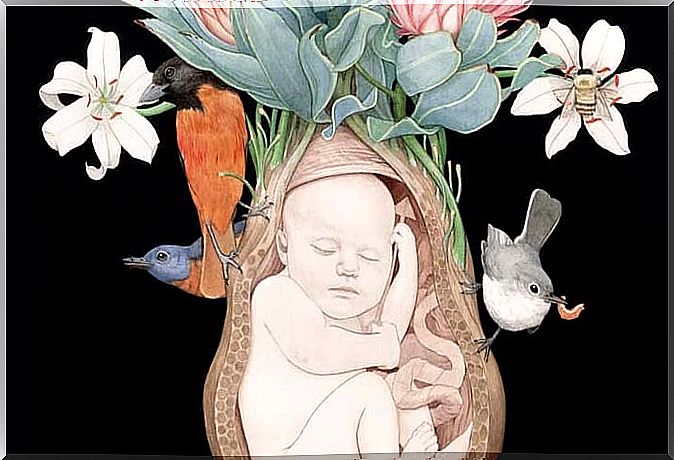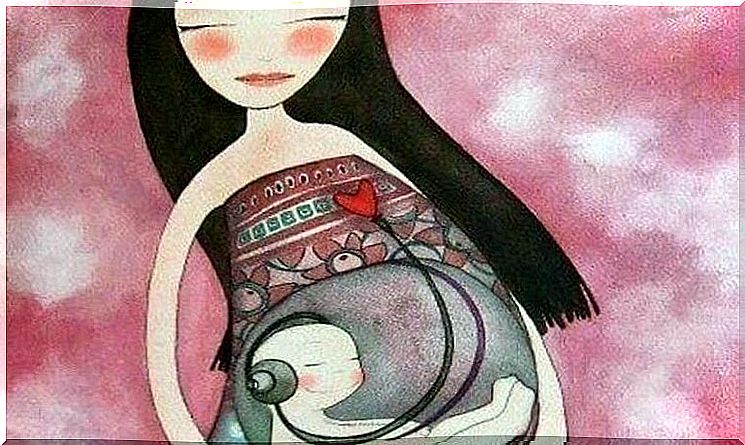Emotional Education From The Womb: Connect With Your Baby

Emotional education from the mother’s womb is an exceptional and wonderful strategy with which it is possible to provide a better personal emotional balance free from stress and anxiety. Thus, taking care of the mother’s emotional world, we also take care of the baby’s proper development.
If we think about it for a moment, we’ll realize something important. During a pregnancy, we schedule our appointments with the doctor, we take care of our food, we exercise, we buy things for the arrival of our child and we think about the parenting style that we are going to follow.
But how do we take care of our emotions? What happens if our relationship with our spouse is not going well or if we are worried about our professional future?
Vivette Glover, perinatal psychobiologist at Imperial College London, explains that there is an intimate and powerful relationship between the mother’s emotions and the way the fetus grows in the womb.
When emotions cross the natural placental barrier
We are often not aware of it, but pregnancy is much more than a hormonal, emotional and physical revolution. We are often sold the idea that pregnancy is wonderful, that it will undoubtedly be the best time of our lives.
However, not all women experience this period in this way.

Months of changes and discomforts
After conception, the mother’s organs make room to allow for cell proliferation and specialization that transforms all specialized tissues into a baby. All these changes are accompanied by discomforts of greater or lesser intensity in each woman.
- Due to the high levels of the hormone Human Chorionic Gonadotropin (HCG) nausea and malaise appear, which can remain until the 16th week of pregnancy in many cases.
- Pregnancy entails a change similar to that of adolescence. We are certainly happy. But there are days when we don’t feel well physically and our spirits drop.
We take care of our body, but not our emotions
Perinatal psychology specialists advise on this aspect: it is necessary to take care of the mother’s emotional world during pregnancy. Ultrasound scans, blood tests and diets are needed. But it is also necessary to know if the woman suffers from stress, anxiety or a hidden depression.
An interesting book published by perinatal psychobiologist Viviene Glover, “ Perinatal and postnatal depression ” (free translation), explains an interesting study carried out at “Imperial College London”, in which the pregnancies of 14,000 women were monitored.
- Their anxiety levels and indicators associated with possible depression were taken into account .
- Later, having given birth, the babies were monitored for 5 years.
- It was found that there is a relationship between a pregnancy experienced in the midst of depression or stress and attention deficit with or without hyperactivity.

Emotional education through the placenta
We all have the idea that the placenta is this impenetrable layer that protects the fetus from any risk. But she is so much more than that. Many mothers continue to think that their worries, their problems at work, in the family, at home, or that this occasional anxiety will not affect the baby.
This is not true . To understand better, we must think about the stressful situation that, for whatever reason, repeats itself day after day.
- In a stressful situation, the hypothalamus produces and releases a hormone called CRH, which subsequently generates cortisol.
- If, as we said, our stress is constant throughout all the months of pregnancy, the natural barrier of the placenta will not be able to fight as much cortisol in the blood.
- It will cross the placenta to the fetus. This is when the baby goes into “alertness” due to these unfavorable biochemicals.
We must become aware of this reality and put into practice changes, new habits and new ways of managing our emotional world. Write down how to put emotional education into practice from the womb.
How To Emotionally Connect With Your Baby
There are several types of intrauterine “lessons” that can be helpful. However, and first of all, we must make one thing very clear: for the baby to be okay, we must be okay. You are therefore the top priority.
If you see your reality as a scenario full of circles that anguish and pressure you, try to keep your distance from them. In these months, the most valuable circle is the one that surrounds you.

- Exercise, such as yoga and meditation, can be very important in focusing on ourselves. In these practices, we become aware of the here and now. Only when we connect with ourselves can we connect with our baby.
- We know that the theme of listening to classical music to stimulate the fetus still in the womb has been in fashion. That’s adequate. But for our part, we recommend you something better: talk to your child.
- Amniotic fluid is a better conductor of sound than air. It’s something magical, a direct bond with your baby that you should enjoy. Talk to him calmly, read books out loud. Allow that natural connection to build already from the womb.
- Gently massage your belly. Also, don’t hesitate to ask your spouse to participate. You can use almond oil or whatever you like. The main purpose is to let the baby know he is wanted. In addition, he needs to know that his mom is happy and that he is calm and balanced.
Don’t hesitate to follow these tips. You will certainly not regret it!









